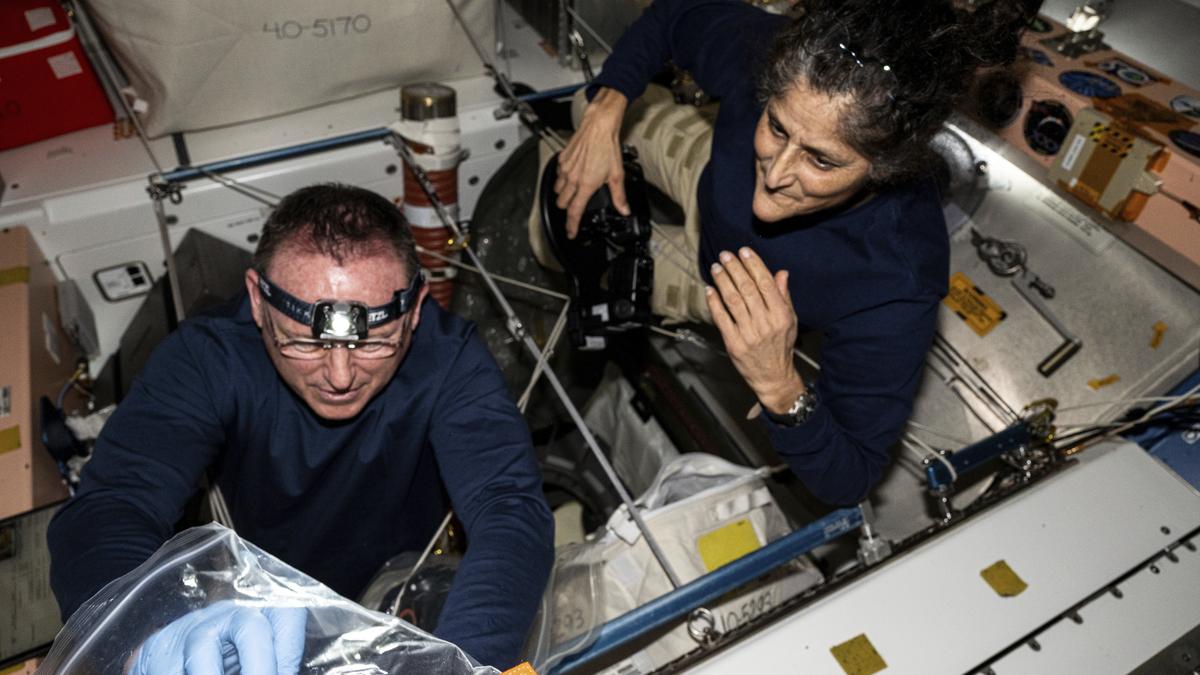NASA Delays Return of Astronauts Sunita Williams and Barry Wilmore Until 2025
NASA has made the difficult decision to delay the return of astronauts Sunita Williams and Barry "Butch" Wilmore from the International Space Station (ISS) until February 2025. Originally scheduled to return via Boeing's new Starliner capsule, the astronauts will now be brought back to Earth by SpaceX due to safety concerns surrounding the Boeing spacecraft.

Astronauts Butch Wilmore (left) and Sunita Williams inspecting safety hardware aboard the ISS. (Photo Credit: AP)
Why NASA Chose SpaceX Over Boeing
NASA's decision stems from a series of technical issues that plagued Boeing's Starliner capsule. During the astronauts' journey to the ISS in June 2024, a cascade of thruster failures and helium leaks compromised the spacecraft's performance. Despite extensive testing and engineering efforts, NASA determined that it was too risky to proceed with the capsule's planned return trip with the astronauts on board.
Instead, NASA has chosen to bring the astronauts back in a SpaceX capsule, a decision that reflects the space agency's commitment to safety. As NASA Administrator Bill Nelson stated, "A test flight by nature is neither safe nor routine. The decision... is a commitment to safety."
Boeing's Troubles Continue
This decision marks another setback for Boeing, a company that has faced increasing scrutiny over safety concerns both in space and aviation. The Starliner program, which was supposed to be a key player in NASA's commercial crew program, has been mired in delays and cost overruns. Despite the challenges, Boeing remains committed to its mission. The company stated, "Boeing continues to focus, first and foremost, on the safety of the crew and spacecraft. We are preparing the spacecraft for a safe and successful uncrewed return."
The Starliner capsule will attempt to return to Earth in early September, but without its crew. The empty capsule will undock from the ISS and fly back to the U.S. desert on autopilot. This crucial test will help determine the future of Boeing's involvement in NASA's crewed missions.
The Astronauts' Perspective
Both Williams, 58, and Wilmore, 61, are seasoned pilots and retired Navy captains with long-duration spaceflight experience. They anticipated surprises on this mission, but not to this extent. During their time on the ISS, they have remained stoic and focused, continuing their work while awaiting a safe return.
Wilmore's wife, Deanna, expressed similar resilience, telling a Tennessee news station, "You just sort of have to roll with it." The delay means more time in space for the astronauts, but it also underscores the importance of ensuring their safe return.
What Comes Next for NASA and Boeing
NASA's decision to postpone the astronauts' return raises questions about the future of the Starliner program. Despite the current issues, NASA still hopes that Boeing can correct the problems and remain a viable partner in its commercial crew program. NASA's goal has always been to have two competing U.S. companies ferrying astronauts in the post-shuttle era, and Boeing's success is critical to that vision.
For now, the focus remains on the safe return of Sunita Williams and Barry Wilmore in February 2025. SpaceX, which has successfully conducted nine astronaut flights since 2020, will once again step up to ensure that NASA's crew members return home safely.
In the meantime, the uncrewed Starliner test flight will provide valuable data for future missions. NASA is committed to learning from these experiences and ensuring that safety remains the top priority for all space exploration efforts.
Additional Resources
Learn more about NASA's Commercial Crew Program and the ongoing challenges faced by Boeing:



